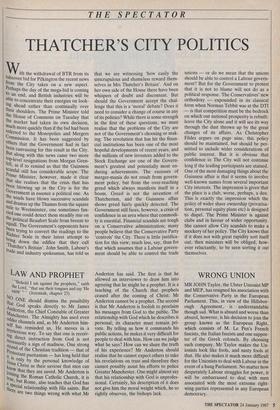THE SPECTATOR
THATCHER'S CITY POLITICS
With the withdrawal of BTR from its takeover bid for Pilkington the recent news from the City takes on a new aspect. Perhaps the day of the mega-bid is coming to an end, and British industries will be a ble to concentrate their energies on look- ing ahead rather than continually over their shoulders. The Prime Minister told the House of Commons on Tuesday that the market had taken its own decision, much more quickly than if the bid had been referred to the Monopolies and Mergers Commission. It has been suggested by others that the Government had in fact been canvassing for this result in the City. But along with this news came two more top-level resignations from Morgan Gren- fell, as if to remind us that the Guinness scandal still has considerable scope. The Phme Minister, however, made it clear that she realises that the crisis that has been blowing up in the City is for the Government in essence a political one. As the winds have blown successive scandals and dramas up the Thames from the square Iiii le to Westminster, one sometimes fan- cled one could detect them steadily rise on the political Beaufort Scale from breeze to squall. The Government's opponents have Richter tying to convert the readings to the bung Scale in their latest attempt to ,°nng down the edifice that they call 1 hatcher's Britain'. John Smith, Labour's trade and industry spokesman, has told us that we are witnessing 'how easily the unscrupulous and shameless reward them- selves in Mrs Thatcher's Britain'. And on her own side of the House there have been whispers of doubt and discontent. But should the Government accept the chal- lenge that this is a 'moral' debate? Does it need to consider a change of course in any of its policies? While there is some strength in the first of these questions, we must realise that the problems of the City are not of the Government's choosing or mak- ing. The revolution that has hit the finan- cial institutions has been one of the most hopeful developments of recent years, and the millions of new investors added to the Stock Exchange are one of the Govern- ment's greatest and potentially most en- during achievements. The excesses of merger-mania do not result from govern- ment policy, but from the over-reaching greed which always manifests itself in a boom. Greed is not the invention of Thatcherism, and the Guinness affair shows greed fairly quickly detected. The Government still faces, however, a crisis of confidence in an area where that commodi- ty is essential. Financial scandals are tough on a Conservative administration; many people believe that the Conservative Party `controls' the City. There is little justifica- tion for this view; much less, say, than for that which assumes that a Labour govern- ment should be able to control the trade unions — or do we mean that the unions should be able to control a Labour govern- ment? But for the Government to protest that it is not to blame will not do as a political response. The Conservatives' new orthodoxy — expounded in its classical form when Norman Tebbit was at the DTI — is that competition must be the bedrock on which our national prosperity is rebuilt: leave the City alone and it will see its way through the dust thrown up by the great changes of its affairs. As Christopher Fildes argues on page nine, this policy should be maintained, but should be per- mitted to include wider considerations of public interest. But it is obvious that confidence in The City will not continue long if the leading participants are stained. One of the most damaging things about the Guinness affair is that it seems to involve well-known names from several important City interests. The impression is given that the place is a club, worse, perhaps, a den. This is exactly the impression which the policy of wider share ownership (privatisa- tion, personal equity plans etc) is designed to dispel. The Prime Minister is against clubs and in favour of wider opportunity. She cannot allow City scandals to make a mockery of her policy. The City knows that if it does not with great rapidity sort itself out, then ministers will be obliged, how- ever reluctantly, to be seen sorting it out themselves.


















































 Previous page
Previous page